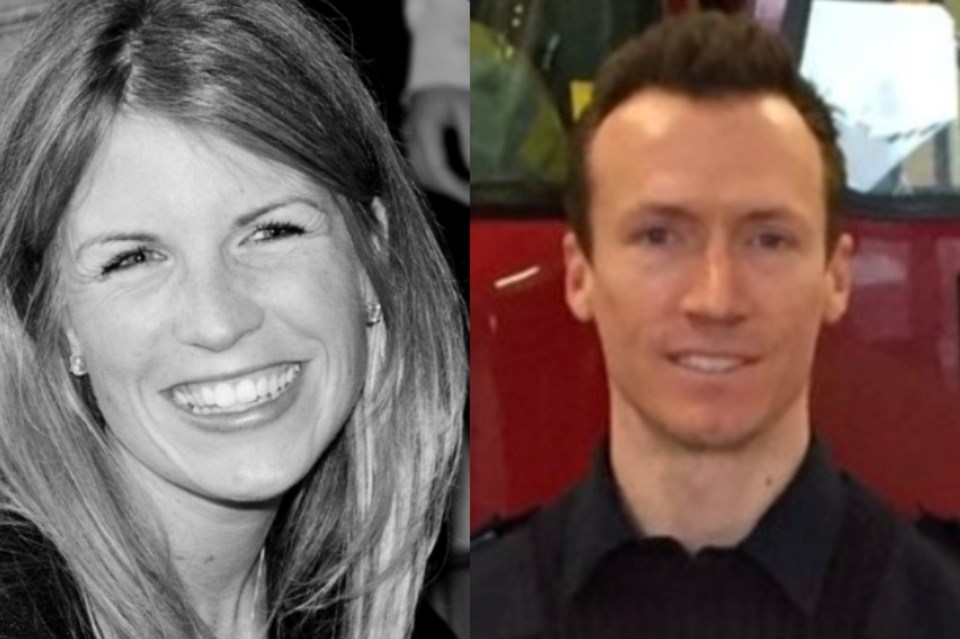James Schwalm has been formally sentenced to life in prison with no chance at parole for 20 years for killing his wife, Ashley, two years ago.
The Collingwood man and former Brampton fire captain showed little emotion as Superior Court Justice Michelle Fuerst passed sentence Monday at the Barrie courthouse after he pleaded guilty to second-degree murder in Ashley’s death.
“He was not a grieving husband but his wife’s murderer,” Fuerst explained in reference to Schwalm’s clumsy attempt to make his wife’s death appear to be a fiery car crash.
At a November sentencing hearing, the Crown had asked for a 22-year upper-limit parole eligibility. The defence countered with a request for 13.
Monday’s proceedings were to decide where in that nine-year range Schwalm could some day apply for parole. That it fell so near to what Crown attorney Lynne Saunders had asked for said all that was required about the judge’s rejection of his defence lawyer’s argument.
“There is little to suggest mitigation,’ said Fuerst, rejecting case law put forward by Schwalm’s counsel, Joelle Klein, that could have lowered his parole eligibility.
“There (could have been) a compelling case for first-degree murder,” the judge added, while giving Schwalm limited credit for pleading guilty and having no previous criminal record while living a “pro-social life.”
The courtroom was once again full of Ashley Schwalm’s friends and family, many of whom wept during the hour-long proceeding.
The atmosphere was jolted when Fuerst passed sentence, recognition the near-to-the maximum request being doled out.
The circumstances of the 40-year-old woman’s murder were as heartbreaking as they were cruel. She was a beloved mother, sister, daughter and friend.
The Schwalms’ marriage was crumbling, but she still had everything to live for, court heard.
But as Fuerst pointed out, James Schwalm could not handle the disruption to his life that a separation and eventual divorce would entail.
“That price was Ashley’s life,” Fuerst said of the extent to which Schwalm was willing to go to soften the blow that parting would have brought.
Court also heard evidence that a million-dollar insurance policy on Ashley’s life could have also been part of his motive.
Schwalm killed his wife just before 3 a.m. on Jan. 26, 2023.
He sent both of their kids to school the next morning; both later told school officials that they had witnessed acts of violence the night before. Their young son was prevented from calling 911 by his father after Ashley asked him to; their daughter told a teacher that her mother had fallen down the stairs, court heard.
Ashley was dead not long after.
“He (sent the children to school) knowing what the kids did not, that they would never see their mother again," Fuerst explained.
Schwalm dressed his wife’s body in hiking gear – taking the time to ask the electronic device known as Alexa the time from the home’s mudroom, a request his son heard – and then drove her body off a steep embankment, not far from Craigleith Ski Club where they had married 10 years earlier.
He then made his way to pick up his mother’s car he had placed nearby to make his getaway back to the children, whom he left alone inside the marital home. He made the final stake-out of the getaway scene the night before with his young son in the car after dropping his daughter at a riding lesson.
After staging a text exchange, Ashley’s car and body were set ablaze, helped along by gas he had her buy under the guise of needing it for his snowblower.
But like most murderers, court heard Schwalm had too much faith in himself and made dumb mistakes, such as dropping a lighter bearing his initials in the vehicle as it tumbled down the side of Arrowhead Road.
Ashley’s body was also placed in the passenger side, a tell-tale sign that she was dead before the car made the fiery plunge, a fact confirmed a few days later by the coroner.
Schwalm was arrested a week later. He’s been in jail the two years since – Feb. 2, 2023 – with at least 18 more to go.
The now-40-year-old sat ramrod straight throughout Monday’s sentencing, not once looking toward the body of the court.
But when he left the prisoner’s dock, Schwalm managed one hurried glance back at the public gallery, as if to bid farewell to his former life.
Led away in handcuffs, Schwalm’s charcoal grey suit clashed with his prison-issued slip-on shoes.
